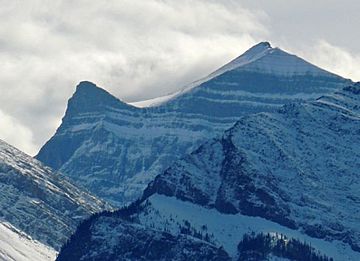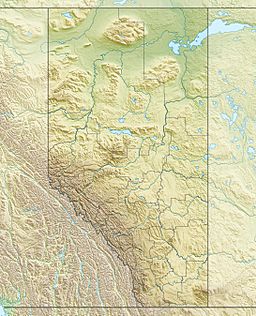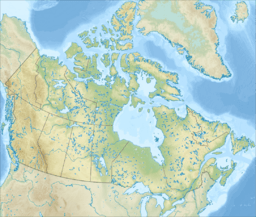Mount Loudon facts for kids
Quick facts for kids Mount Loudon |
|
|---|---|

Mount Loudon
|
|
| Highest point | |
| Elevation | 3,221 m (10,568 ft) |
| Prominence | 767 m (2,516 ft) |
| Parent peak | Mount Murchison (3353 m) |
| Listing | Mountains of Alberta |
| Geography | |
| Location | Alberta, Canada |
| Parent range | Murchison Group Canadian Rockies |
| Topo map | NTS 82N/16 |
| Geology | |
| Age of rock | Cambrian |
| Type of rock | Sedimentary |
| Climbing | |
| First ascent | 1972 A. Ridley, A. Daffern |
Mount Loudon is a tall mountain in Alberta, Canada. It stands 3,221 meters (about 10,568 feet) high. This mountain is part of the Canadian Rockies, a famous mountain range. You can find Mount Loudon in the Siffleur Wilderness Area. It's close to the North Saskatchewan River valley.
Mount Loudon's nearest higher peak is Mount Murchison, which is about 15 kilometers (9 miles) to the west. Siffleur Mountain is just northeast, and Mount Peskett is immediately north. From Highway 11, also known as the David Thompson Highway, you can see this impressive peak. Water from the mountain flows into the North Saskatchewan River through Loudon Creek and Porcupine Creek.
Contents
The Story Behind Mount Loudon's Name
Mount Loudon got its name from a man named William James Loudon (1860-1951). He was a geologist and a professor at the University of Toronto.
The mountain was named by Morrison P. Bridgland (1878-1948). Bridgland was a land surveyor who named many peaks in the Canadian Rockies. He likely knew Professor Loudon from his time studying at the University of Toronto. William James Loudon was also the nephew of James Loudon (1841-1916), who was the President of the University of Toronto.
The mountain's name became official in 1957. This happened when the Geographical Names Board of Canada approved it.
The first ascent of Mount Loudon was made in 1972. Two climbers, Ann Ridley and Tony Daffern, were the first to reach its summit.
How Mount Loudon Was Formed
Mount Loudon is made of sedimentary rock. This type of rock forms from layers of sand, mud, and other materials that build up over millions of years. These layers were laid down from the Precambrian to the Jurassic periods.
Later, during a time called the Laramide orogeny, huge forces pushed these rock layers. They were pushed east and moved over younger rock. This process created the tall mountains we see today in the Rockies.
Mount Loudon's Climate
Mount Loudon has a subarctic climate. This means it has very cold and snowy winters. The summers are usually mild.
Temperatures can drop below -20 °C (which is -4 °F). With the wind chill factor, it can feel even colder, sometimes below -30 °C (-22 °F).
See also
 In Spanish: Monte Loudon para niños
In Spanish: Monte Loudon para niños
 | James Van Der Zee |
 | Alma Thomas |
 | Ellis Wilson |
 | Margaret Taylor-Burroughs |



